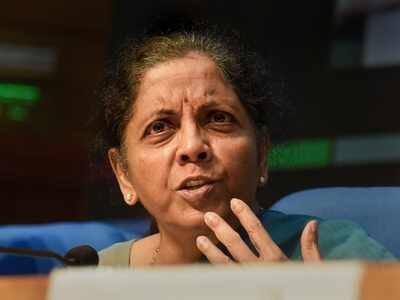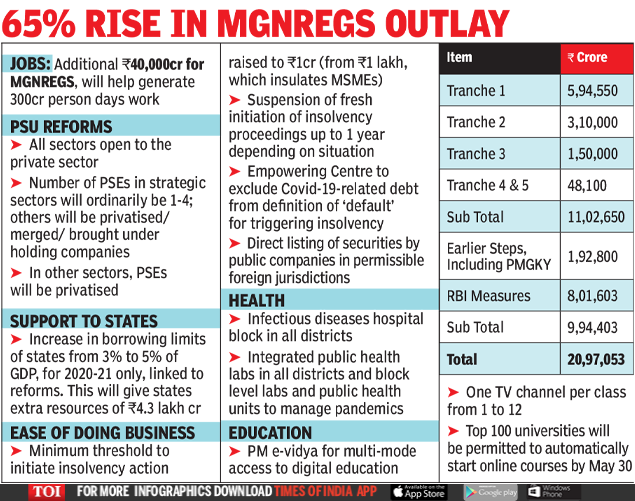
NEW DELHI: Finance minister Nirmala Sitharaman on Sunday unveiled the government’s plan to limit the role of public sector companies across the economy, while announcing assistance to help migrants, companies and state governments tackle the impact of the Covid-19 crisis, and provided more money for the rural job guarantee programme.
Although these steps will impact the focus segments immediately, there were initiatives such as infectious disease blocks in every districts and labs in every block that are expected to take time before they can be implemented. There were also steps to enable children to attend classes from home using a television broadcast with 200 new electronic textbooks to be added to aid learning.
The finance minister said the government will soon announce a new policy for public sector enterprises which will pave the way for the entry of private companies in all sectors where state-run firms are present. Even in the strategic sectors, PSU presence will be limited to 1-4 entities while in the other segments of the economy, the government will privatise state-run companies.

Sunday’s announcements, the fifth in as many days, also saw the government respond to criticism over the actual size of the Rs 20-lakh-crore package, with the finance minister giving a detailed break-up to show that the steps announced by her will result in a stimulus of over Rs 11 lakh crore, while the RBI’s moves and the PM Garib Kalyan Yojana related announcements was to the tune of Rs 10 lakh crore.
Analysts suggested that the fiscal cost was much lower with HSBC estimating it at around 1% of GDP, while ratings agency estimated the outlay at around Rs 2.7 lakh crore, excluding the Rs 1.5 lakh crore which will play out over time. "About 10% of this stimulus can be traced as direct additional budgetary cost to the central exchequer. Nearly 5% of the stimulus relates to already budgeted expenditures," EY India chief policy adviser DK Srivastava said.
But this was part of a well-thought-out strategy by the government. "We are not splurging money, we are being responsible," the FM told reporters even as a section of the industry demanded a bigger helping hand.
The latest announcements sought to provide much-needed support to migrants earn some income once they return home, with the Centre announcing a 65%, or Rs 40,000 crore, increase in the National Rural Employment Guarantee scheme outlay for the current year to create 300 crore man days. This is seen as a temporary assistance with the government hoping that workers will return to industrial hubs once the situation improves and the lockdown is eased.
States too got a part of what they wanted with the Centre raising their borrowing limit to help them raise around Rs 4.3 lakh crore to help them deal with a revenue shortfall and higher spending. But the relief came with conditions to initiate crucial reforms such as making power distribution companies more efficient, toning up urban local bodies and ensuring ease of doing business percolates to the grassroots level.
There was also reprieve for companies facing financial distress due to the lockdown. While fresh insolvency action will be deferred by up to 12 months, there will be a relief for loan delinquencies arising due to the coronavirus pandemic.
In Video:Public sectors open to private players, government to stay in key areas: Sitharaman
Although these steps will impact the focus segments immediately, there were initiatives such as infectious disease blocks in every districts and labs in every block that are expected to take time before they can be implemented. There were also steps to enable children to attend classes from home using a television broadcast with 200 new electronic textbooks to be added to aid learning.
The finance minister said the government will soon announce a new policy for public sector enterprises which will pave the way for the entry of private companies in all sectors where state-run firms are present. Even in the strategic sectors, PSU presence will be limited to 1-4 entities while in the other segments of the economy, the government will privatise state-run companies.

Sunday’s announcements, the fifth in as many days, also saw the government respond to criticism over the actual size of the Rs 20-lakh-crore package, with the finance minister giving a detailed break-up to show that the steps announced by her will result in a stimulus of over Rs 11 lakh crore, while the RBI’s moves and the PM Garib Kalyan Yojana related announcements was to the tune of Rs 10 lakh crore.
Analysts suggested that the fiscal cost was much lower with HSBC estimating it at around 1% of GDP, while ratings agency estimated the outlay at around Rs 2.7 lakh crore, excluding the Rs 1.5 lakh crore which will play out over time. "About 10% of this stimulus can be traced as direct additional budgetary cost to the central exchequer. Nearly 5% of the stimulus relates to already budgeted expenditures," EY India chief policy adviser DK Srivastava said.
But this was part of a well-thought-out strategy by the government. "We are not splurging money, we are being responsible," the FM told reporters even as a section of the industry demanded a bigger helping hand.
The latest announcements sought to provide much-needed support to migrants earn some income once they return home, with the Centre announcing a 65%, or Rs 40,000 crore, increase in the National Rural Employment Guarantee scheme outlay for the current year to create 300 crore man days. This is seen as a temporary assistance with the government hoping that workers will return to industrial hubs once the situation improves and the lockdown is eased.
States too got a part of what they wanted with the Centre raising their borrowing limit to help them raise around Rs 4.3 lakh crore to help them deal with a revenue shortfall and higher spending. But the relief came with conditions to initiate crucial reforms such as making power distribution companies more efficient, toning up urban local bodies and ensuring ease of doing business percolates to the grassroots level.
There was also reprieve for companies facing financial distress due to the lockdown. While fresh insolvency action will be deferred by up to 12 months, there will be a relief for loan delinquencies arising due to the coronavirus pandemic.
In Video:Public sectors open to private players, government to stay in key areas: Sitharaman
Download
The Times of India News App for Latest Business News
more from times of india business
Quick Links
Coronavirus in MumbaiCoronavirus in KolkataCoronavirus in HyderabadCoronavirus in DelhiCoronavirus in BangaloreCoronavirus symptomsCoronavirus in IndiaWhat is CoronavirusCoronavirus NewsSolar EclipseNPRWhat is NRCCAB BillCAB and NRCRTI BillPodcast newsLok SabhaShiv SenaYSRCPCongressBJP newsUIDAIIndian ArmyISRO newsSupreme Court
Get the app








